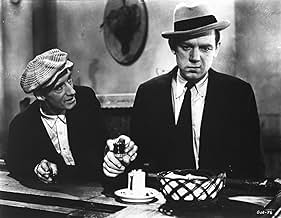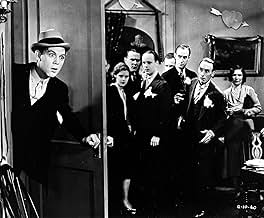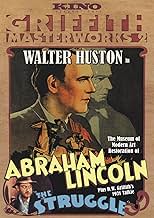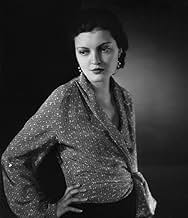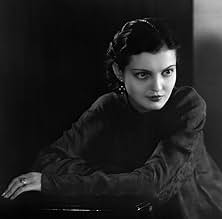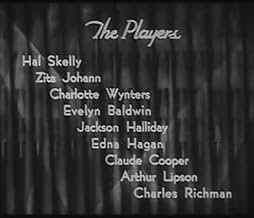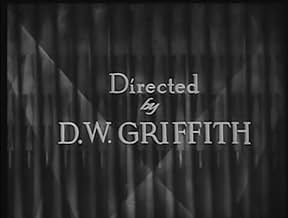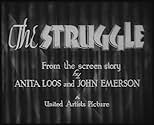Aggiungi una trama nella tua linguaA young couple's marriage is jeopardized by the husband's descent into alcoholism.A young couple's marriage is jeopardized by the husband's descent into alcoholism.A young couple's marriage is jeopardized by the husband's descent into alcoholism.
- Regia
- Sceneggiatura
- Star
Kate Bruce
- Granny
- (non citato nei titoli originali)
Tammany Young
- Barfly
- (non citato nei titoli originali)
Recensioni in evidenza
Griffith's title of this movie lives up to what he must have gone through to get the movie made. It's a story that he could've easily made in the midst of the silent era circa 1913. It moves like his Biograph shorts, just with sound. Zita Johann is so 'Alice Joyce-like' in her performance that is the sympathetic-understanding wife type. Why doesn't she just take the daughter and leave Hal Skelly one would ask?
The later parts of the film pick up steam as opposed to the earlier parts. A group of children taunt Kelly in the street after his descent into alcoholism and loss of his job. Griffith meant to show the kids as cruel but they are more cute than malevolent. They are dressed like they are readying for a Little Rascals shoot. If you're acquainted with Griffiths numerous Biograph shorts, especially the preachy ones making moral statements, this film shows his return to this genre.
The later parts of the film pick up steam as opposed to the earlier parts. A group of children taunt Kelly in the street after his descent into alcoholism and loss of his job. Griffith meant to show the kids as cruel but they are more cute than malevolent. They are dressed like they are readying for a Little Rascals shoot. If you're acquainted with Griffiths numerous Biograph shorts, especially the preachy ones making moral statements, this film shows his return to this genre.
THE STRUGGLE (United Artists, 1931), directed by the legendary D.W. Griffith of such silent screen classics as THE BIRTH OF A NATION (1915), INTOLERANCE (1916), WAY DOWN EAST (1920), ORPHANS OF THE STORM (1921), takes the director's chair for the last time for his second talkie. Following his biographical all-talking success of ABRAHAM LINCOLN (1930) starring Walter Huston, Griffith's work for THE STRUGGLE turns out to be something more heavy-handled in regards to one man's struggle with alcoholism. Featuring a cast of unknowns rather than actors from the Griffith stock company of the past, the story is headed by stage performers of Hal Skelly, with some talkies to his credit, the best noted being THE DANCE OF LIFE (Paramount, 1929); and Zita Johann, better known to many for her performance opposite Boris Karloff in THE MUMMY (Universal, 1932), each doing their best in a scripted story by Anita Loos.
FORWARD: "This is a true narrative based on actual fact mirroring what is happening to thousands of families throughout the land. While 'The Struggle' is a powerful indictment of bootleg liquor emphasizing its devastating effect on American youth, it is not presented as a preachment either or against Prohibition. The picture, however, does raise these questions: If Prohibition is a success that people claim it is, how could all these things have happened? Is man's struggle against intemperance controllable by law, or is it solely a matter of individual characters." Prologue: 1911. Against the underscoring to "In the Good Old Summertime," couples are gathered together drinking and dancing at a beer garden, some discussing the current events of the day of movie actress, Mary Pickford, and of Ziegfeld Follies girl Peggy Joyce " getting married again." Move forward to 1923, where music has been jazzed up, and Prohibition and bootlegging liquor is in the news. Jimmy Wilson (Hal Skelly) is seen at a speakeasy socializing and boozing it up with the patrons. One of them in attendance is Florrie (Zita Johann), who not only loves Jimmy but wants him to stop drinking. They soon marry with Jimmy promising never to drink liquor again. Their marriage is blessed with a daughter, Mary (Edna Hagen), and Jimmy keeping true to his promise until he takes a drink again. His drunken appearance and obnoxious manner soon spoils the engagement party for his sister, Nan (Evelyn Baldwin) to Johnnie Marshall (Jackson Halliday), which finds him fired by his employer, Mr. Craig (Charles Richman), also a guest at the event. Jimmy's boozing puts a strain of his marriage, especially after his involvement with Nan (Charlotte Wynters), a cabaret girl who, along with her boyfriend, wipes him out of his savings, leaving his family to lose their apartment. Jimmy becomes a homeless bum of the streets, followed by a series of other unforeseen circumstances.
While melodramatic themes about alcoholism might have worked better during the silent 1920s movie era reflecting upon the Prohibition era (or possibly the film noir realism style of the 1940s in the wake of Ray Milland's powerful Academy Award winning performance as an alcoholic in THE LOST WEEKEND (Paramount, 1945)), Griffith's THE STRUGGLE only became a notorious flop. Possibly the reason for its theatrical failure comes at the time of its release (being the peek of the Great Depression), or possibly how the movie itself being poorly constructed with a outdated acting style with script reflecting back to the silent movie days. While THE STRUGGLE did have some fresh new faces, so to speak, in the cast, its direction by Griffith must have seemed out of date for 1931 or ahead of its time by today's standards. The actors do what's expected pf them, but there's something lacking here to make this into a strong and powerful story. There have been other movies of this nature with depressing theme with realistic and unpleasant motivations that have proven successful, THE STRUGGLE. however, didn't garner any Academy Award nominations and the success of THE LOST WEEKEND.
Unseen for decades probably due to its reputation, to date, THE STRUGGLE has never been shown on television, except for clips on the film on documentaries on D.W. Griffith. A struggle for some, a curiosity for others, THE STRUGGLE is of notability today solely on the D.W. Griffith name attached to it, especially for movie scholars and fans of the director's work. This 76 minute feature film production has become available for rediscovering on DVD from Kino Video with Griffiths ABRAHAM LINCOLN on its flip-side. (*1/2)
FORWARD: "This is a true narrative based on actual fact mirroring what is happening to thousands of families throughout the land. While 'The Struggle' is a powerful indictment of bootleg liquor emphasizing its devastating effect on American youth, it is not presented as a preachment either or against Prohibition. The picture, however, does raise these questions: If Prohibition is a success that people claim it is, how could all these things have happened? Is man's struggle against intemperance controllable by law, or is it solely a matter of individual characters." Prologue: 1911. Against the underscoring to "In the Good Old Summertime," couples are gathered together drinking and dancing at a beer garden, some discussing the current events of the day of movie actress, Mary Pickford, and of Ziegfeld Follies girl Peggy Joyce " getting married again." Move forward to 1923, where music has been jazzed up, and Prohibition and bootlegging liquor is in the news. Jimmy Wilson (Hal Skelly) is seen at a speakeasy socializing and boozing it up with the patrons. One of them in attendance is Florrie (Zita Johann), who not only loves Jimmy but wants him to stop drinking. They soon marry with Jimmy promising never to drink liquor again. Their marriage is blessed with a daughter, Mary (Edna Hagen), and Jimmy keeping true to his promise until he takes a drink again. His drunken appearance and obnoxious manner soon spoils the engagement party for his sister, Nan (Evelyn Baldwin) to Johnnie Marshall (Jackson Halliday), which finds him fired by his employer, Mr. Craig (Charles Richman), also a guest at the event. Jimmy's boozing puts a strain of his marriage, especially after his involvement with Nan (Charlotte Wynters), a cabaret girl who, along with her boyfriend, wipes him out of his savings, leaving his family to lose their apartment. Jimmy becomes a homeless bum of the streets, followed by a series of other unforeseen circumstances.
While melodramatic themes about alcoholism might have worked better during the silent 1920s movie era reflecting upon the Prohibition era (or possibly the film noir realism style of the 1940s in the wake of Ray Milland's powerful Academy Award winning performance as an alcoholic in THE LOST WEEKEND (Paramount, 1945)), Griffith's THE STRUGGLE only became a notorious flop. Possibly the reason for its theatrical failure comes at the time of its release (being the peek of the Great Depression), or possibly how the movie itself being poorly constructed with a outdated acting style with script reflecting back to the silent movie days. While THE STRUGGLE did have some fresh new faces, so to speak, in the cast, its direction by Griffith must have seemed out of date for 1931 or ahead of its time by today's standards. The actors do what's expected pf them, but there's something lacking here to make this into a strong and powerful story. There have been other movies of this nature with depressing theme with realistic and unpleasant motivations that have proven successful, THE STRUGGLE. however, didn't garner any Academy Award nominations and the success of THE LOST WEEKEND.
Unseen for decades probably due to its reputation, to date, THE STRUGGLE has never been shown on television, except for clips on the film on documentaries on D.W. Griffith. A struggle for some, a curiosity for others, THE STRUGGLE is of notability today solely on the D.W. Griffith name attached to it, especially for movie scholars and fans of the director's work. This 76 minute feature film production has become available for rediscovering on DVD from Kino Video with Griffiths ABRAHAM LINCOLN on its flip-side. (*1/2)
....when you consider some of the other movies for the year - "The Public Enemy", "Bad Girl", "The Maltese Falcon", "Waterloo Bridge", and that "The Struggle" was released in December of that year. Like the other reviewers, I was a bit hesitant to watch it - the last time I saw it was in the early 70s, at a film society and the only information I could find out about it then was in Anthony Slide's book "The Griffith Actresses" and he spent the article vigorously defending it against what critics had said when it was first released. They hated it and apparently there was even laughter in the first night audience. They called it old fashioned and criticized the banal dialogue - by 1931 Griffith was finished in Hollywood and critics were not going to view "The Struggle" with an unbiased eye. From the moralizing forward to the fact that there didn't seem much of a reason for Jimmy's descent into Hell, shows why it wasn't a success at the time. Sure, the depression was on but the public probably didn't want to be reminded of what, to many families (according to the forward) was a too real problem.
The movie took a sermonizing, finger shaking view. The prologue didn't seem to serve a purpose - except to show off the overlapping dialogue technique and to show that people were getting drunk (it was 1911) even before prohibition. 1923 - Zita Johann plays Florrie, a typical Griffith heroine, sweet, innocent and believing in her man - Jimmy (Hal Skelly), who, even before they marry, is considered the life of the party. The thing I found hard to swallow was that there was no huge crisis that happened for Jimmy to fall off the wagon. Of course, before his marriage he takes "the pledge" and they have several happy years, before a bar-tender's snide remark at his drink of choice - sarsaparilla, causes him to go on a bender. In another scene the thought of having to wear a lavender tie causes him to miss his sister's engagement for a night on the town. The best scene, in my opinion, is Hal Skelly's bout of the D.Ts - his was the best performance in the movie. I believe he could have developed into a great character actor, if he had lived. Zita Johann had been recruited from Broadway, where, along with Clark Gable, she had appeared in the play "Machinal", but in this movie, she looked very new and obviously wasn't a natural for the movies. (She only made a few, including "The Mummy" before she returned to the stage). Most of the performances seemed stiff and lacking in the direction that Griffith should have provided. Helen Mack made her debut as a "catty" girl at the engagement party and Evelyn Baldwin, who became Mrs. D.W. Griffith in 1936 played Jimmy's sister, Nan.
The movie took a sermonizing, finger shaking view. The prologue didn't seem to serve a purpose - except to show off the overlapping dialogue technique and to show that people were getting drunk (it was 1911) even before prohibition. 1923 - Zita Johann plays Florrie, a typical Griffith heroine, sweet, innocent and believing in her man - Jimmy (Hal Skelly), who, even before they marry, is considered the life of the party. The thing I found hard to swallow was that there was no huge crisis that happened for Jimmy to fall off the wagon. Of course, before his marriage he takes "the pledge" and they have several happy years, before a bar-tender's snide remark at his drink of choice - sarsaparilla, causes him to go on a bender. In another scene the thought of having to wear a lavender tie causes him to miss his sister's engagement for a night on the town. The best scene, in my opinion, is Hal Skelly's bout of the D.Ts - his was the best performance in the movie. I believe he could have developed into a great character actor, if he had lived. Zita Johann had been recruited from Broadway, where, along with Clark Gable, she had appeared in the play "Machinal", but in this movie, she looked very new and obviously wasn't a natural for the movies. (She only made a few, including "The Mummy" before she returned to the stage). Most of the performances seemed stiff and lacking in the direction that Griffith should have provided. Helen Mack made her debut as a "catty" girl at the engagement party and Evelyn Baldwin, who became Mrs. D.W. Griffith in 1936 played Jimmy's sister, Nan.
By the time he made this film, Hollywood had D.W. Griffith right where they wanted him; a broken man. His studio was gone and he was selling out his UA shares--to make this film, I think. It's a shame that things went so wrong for him at this time, for it is evident in "The Struggle" that he was figuring out how to use this new sound gizmo. I was very impressed by his use of sound, almost Altman-like at times with overlapping dialogues. But, sadly, Hollywood had moved beyond DW, and didn't need or want him around anymore. This film is not the calibre of "Broken Blossoms" or "Intolerance", but it's a fine effort on a small scale from one of filmdom's greats.
The Struggle (1931)
There is one main reason to see this film—it is D.W. Griffith's last. Whatever horrors he is responsible for supporting the KKK in "Birth of a Nation," he was a maverick, a brilliant innovator. This is the end of the line, twenty years after he got going full steam.
The theme here is so prominent it almost dwarfs the plot—drinking. And getting drunk. The first example of a woman being drunk at a party is almost laughable, at least to those of us who have seen more than one person who has drunk "too much."
The filming here is typical Griffith, and he moves the story through the very years of his career, and the scenes update from the teens to the twenties to the "present," meaning 1931, a year or so before the end of Prohibition. You can make a case, I think, for some kind of radical fracturing of the plot, with a whole slew of characters and story lines started in the beginning of the movie and never followed up. It avoids normal linear storytelling.
It's tough to compare to other movies from 1931—this was still generally a rough time for the movie industry getting used to sound, but we are starting to see masterful meldings of visual and aural components, along with the consistency of acting and plot. The camera doesn't do much moving, and the sound is sometimes muddled or coarse, but you can rise above the limitations and see glimmers of both brilliance and depth. Truly—glimmers I mean. This isn't a brilliant movie.
There is a pretty linear downward trend here, and almost predictable. And the scenes are increasingly simple, showing interior rooms from one point of view. What holds it up at the best moments is some intense acting (the little girl, among the brightest spots). But it's no masterpiece, and could easily be avoided on your watch list.
There is one main reason to see this film—it is D.W. Griffith's last. Whatever horrors he is responsible for supporting the KKK in "Birth of a Nation," he was a maverick, a brilliant innovator. This is the end of the line, twenty years after he got going full steam.
The theme here is so prominent it almost dwarfs the plot—drinking. And getting drunk. The first example of a woman being drunk at a party is almost laughable, at least to those of us who have seen more than one person who has drunk "too much."
The filming here is typical Griffith, and he moves the story through the very years of his career, and the scenes update from the teens to the twenties to the "present," meaning 1931, a year or so before the end of Prohibition. You can make a case, I think, for some kind of radical fracturing of the plot, with a whole slew of characters and story lines started in the beginning of the movie and never followed up. It avoids normal linear storytelling.
It's tough to compare to other movies from 1931—this was still generally a rough time for the movie industry getting used to sound, but we are starting to see masterful meldings of visual and aural components, along with the consistency of acting and plot. The camera doesn't do much moving, and the sound is sometimes muddled or coarse, but you can rise above the limitations and see glimmers of both brilliance and depth. Truly—glimmers I mean. This isn't a brilliant movie.
There is a pretty linear downward trend here, and almost predictable. And the scenes are increasingly simple, showing interior rooms from one point of view. What holds it up at the best moments is some intense acting (the little girl, among the brightest spots). But it's no masterpiece, and could easily be avoided on your watch list.
Lo sapevi?
- QuizThis was the final feature-length film directed by D.W. Griffith.
I più visti
Accedi per valutare e creare un elenco di titoli salvati per ottenere consigli personalizzati
Dettagli
- Data di uscita
- Paese di origine
- Lingua
- Celebre anche come
- Ten Nights in a Bar Room
- Luoghi delle riprese
- Aziende produttrici
- Vedi altri crediti dell’azienda su IMDbPro
- Tempo di esecuzione
- 1h 27min(87 min)
- Colore
- Proporzioni
- 1.20 : 1
Contribuisci a questa pagina
Suggerisci una modifica o aggiungi i contenuti mancanti

